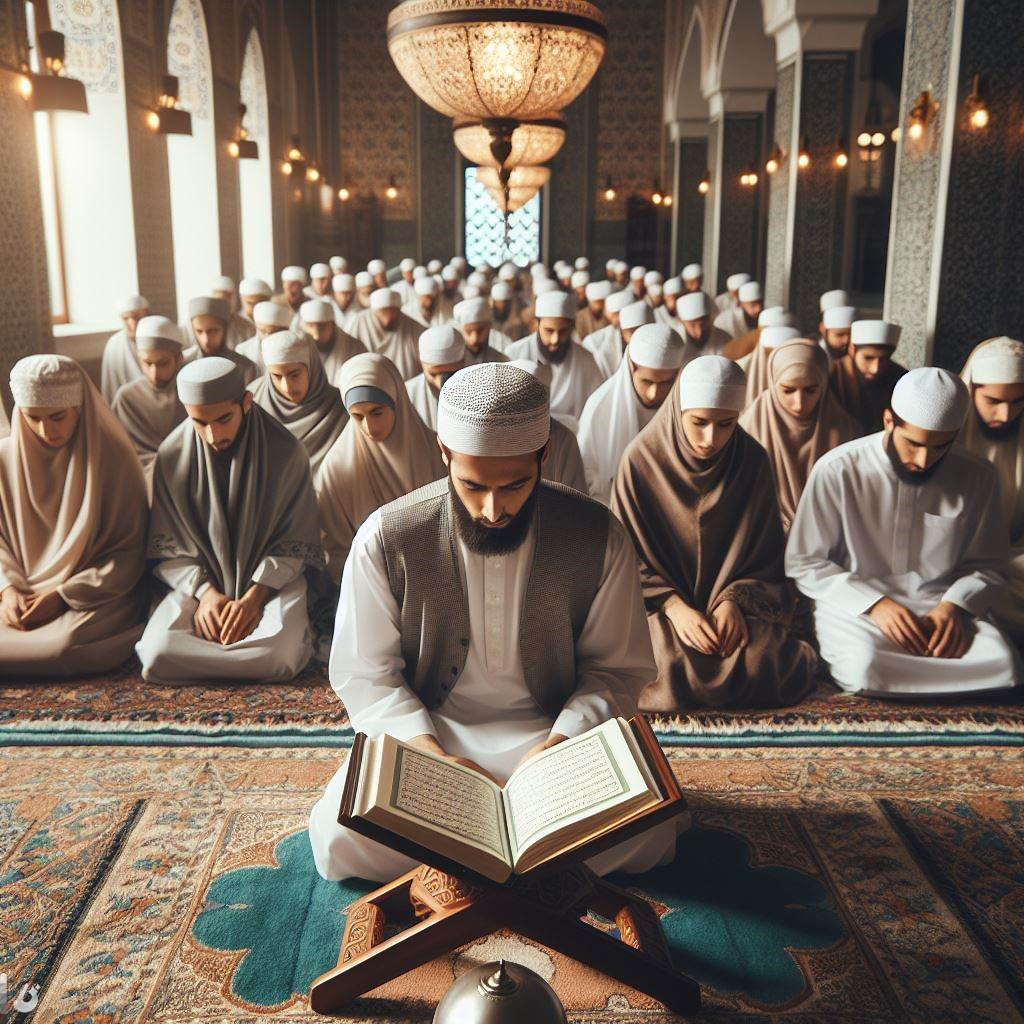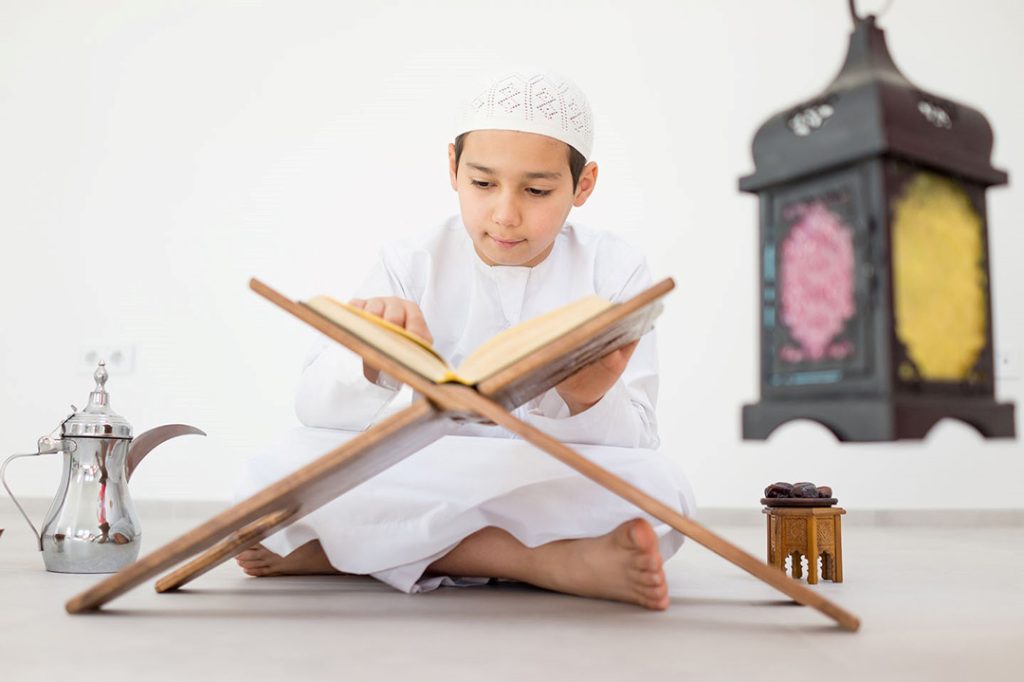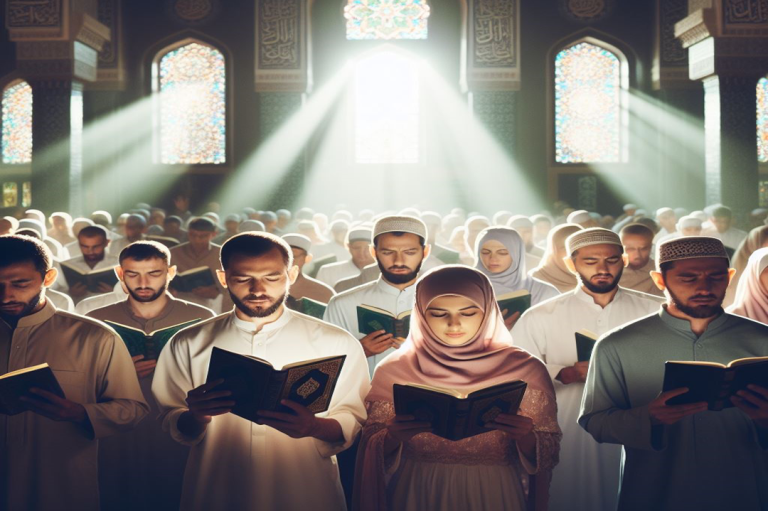The best Knowledge is that by which you perfect your growing and guidance and the worst one is that by which you spoil your Hereafter.
Ali ibn abi talib(a)
Table of Contents
ToggleThe recitation of the Holy Quran holds immense significance in the lives of Muslims around the world. Known as “Tilawah” in Arabic it is a fundamental practice deeply rooted in Islamic culture and spirituality.
This paper aims to explore the various aspects of Quranic recitation including its historical background the significance it holds within the Muslim community and the different styles and techniques employed during the recitation process.
By delving into this topic we can gain a deeper understanding of the Quran’s sacredness and the spiritual connection it fosters among believers.
Historical Background
The recitation of the Holy Quran has its origins in the revelation of the holy book to the Prophet Muhammad over the course of 23 years in the 7th century CE.
The Holy Quran believed to be the literal word of God as revealed to the Prophet was initially transmitted orally. This oral tradition played a vital role in preserving the Quran’s integrity and accuracy ensuring that it was transmitted without any alteration or corruption.
The practice of reciting the noble Quran gained prominence during the time of the Prophet Muhammad who himself recited the verses to his companions and encouraged them to do the same. The Prophet’s companions known as the Sahaba memorized the Quranic verses and transmitted them to subsequent generations through a chain of narrators.
This oral transmission known as “Tawatur ” has been meticulously preserved by Muslim scholars throughout history.
Significance of Quranic Recitation
The significance of Quranic recitation is exemplified in the lives of several key figures in Islamic history, who have played a crucial role in the development and preservation of the Quranic tradition.
One such figure is Uthman ibn Affan, the third caliph of Islam, who commissioned the compilation and standardization of the Quran into a single written text during his reign in the mid-7th century.
This monumental task ensured the preservation of the Quran for future generations and established a standardized form of recitation that has been upheld to this day.
Another prominent figure in the history of Quranic recitation is Imam Al-Shatibi, a renowned scholar of Quranic sciences who lived in Andalusia during the 14th century.
He made significant contributions to the study of Quranic recitation, particularly in the field of Tajwid, or the rules of Quranic recitation.
His work laid the foundation for the codification of the various modes of recitation (Qiraat ) that have been passed down through the centuries and are still practiced by Muslims around the world.
Impact of Quranic Recitation
The significance of Quranic recitation extends beyond its historical and religious importance; it has also had a profound impact on the cultural and artistic traditions of the Islamic world.
The recitation of Quran is characterized by its melodic and rhythmic nature, which has inspired the development of various forms of Quranic chanting and vocal performance.
This has given rise to a rich tradition of Quranic recitation that encompasses a wide range of styles and techniques, each reflecting the unique cultural and regional influences of the Muslim world.
In addition to its cultural impact, Quranic recitation has also played a significant role in the spiritual and personal development of individual Muslims. The act of reciting Quran is believed to have therapeutic and healing effects, as it is thought to purify the soul and bring comfort to the heart.
Many Muslims recite Quran daily as a form of worship, seeking spiritual enlightenment and inner peace through the recitation of its verses.
Influential Individuals in Quranic Recitation
Several influential individuals have made significant contributions to the field of Quranic recitation, leaving a lasting impact on the practice and study of the Quran.
One such figure is Sheikh Abdul Basit Abdus Samad, a renowned Egyptian Qari (reciter) who gained international fame for his beautiful and masterful recitation of Quran. His melodious voice and impeccable Tajwid (recitation rules) mesmerized audiences and inspired countless Muslims to perfect their own recitation of Quran.
Another influential figure is Sheikh Al-Husary, a prominent Egyptian Qari who was known for his meticulous adherence to the rules of Tajwid and his efforts to teach and preserve the various modes of Quranic recitation.
He made significant contributions to the field of Quranic recitation through his recordings and instructional materials, which have served as a valuable resource for students of Quran around the world.

Various Perspectives on Quranic Recitation
The significance of Quranic recitation has been viewed from various perspectives, each offering a unique insight into its cultural, spiritual, and historical importance.
From a spiritual standpoint, Quranic recitation is seen as a means of connecting with the divine and seeking guidance and solace in the words of Allah. Many Muslims consider the act of reciting Quran to be a deeply personal and spiritual experience, allowing them to strengthen their faith and cultivate a sense of inner peace and tranquility.
From a cultural perspective, Quranic recitation has played a pivotal role in shaping the artistic and musical traditions of the Islamic world.
The development of various styles and modes of recitation has given rise to a vibrant and diverse repertoire of Quranic chants and vocal performances, each reflecting the rich cultural heritage of the Muslim world.
Quranic recitation has thus become an integral part of the cultural identity of Muslim communities, serving as a source of pride and inspiration for artists and performers.
On the other hand, some critics have raised concerns about the commercialization and commodification of Quranic recitation, particularly in the age of digital media and online platforms.
The widespread availability of Quranic recitations on the internet and social media has led to the commercialization of the art form, with some individuals seeking fame and fortune through their recitations. This has raised ethical questions about the sincerity and intention of those who engage in Quranic recitation for personal gain rather than spiritual fulfillment.
Future Developments in Quranic Recitation
As the Muslim world continues to grapple with the challenges of modernity and globalization, the practice and significance of Quranic recitation are likely to undergo further developments in the years to come.
Advances in technology and media production have made Quranic recitation more accessible than ever, allowing individuals to learn and practice the art form from the comfort of their own homes.
This has led to a resurgence of interest in Quranic recitation among Muslims of all ages, as they seek to reconnect with their religious and cultural heritage in a rapidly changing world.
Furthermore, the study and preservation of Quranic recitation are likely to continue to evolve, as scholars and educators seek to safeguard the authenticity and integrity of the Quranic tradition.
Efforts to document and standardize the various modes of Quranic recitation, as well as to promote the teaching and study of Tajwid, are essential for preserving the historical and cultural significance of Quranic recitation for future generations.
This will require the collective efforts of scholars, educators, and community leaders to ensure that the practice of Quranic recitation remains true to its roots and continues to inspire and uplift Muslim communities around the world.
The significance of Quranic recitation is deeply rooted in the historical, cultural, and spiritual traditions of the Islamic world. From its origins in the time of the Prophet Muhammad to its enduring impact on the artistic and spiritual life of Muslim communities, Quranic recitation continues to play a vital role in shaping the identity and heritage of the Muslim world.
As the practice of Quranic recitation continues to evolve in response to the challenges and opportunities of the modern age, it is essential to recognize and uphold its significance as a timeless and sacred tradition that has the power to inspire and transform the hearts of believers for generations to come.

Styles and Techniques of Recitation
The recitation of the Holy Quran involves various styles and techniques that have been passed down through generations. These styles are known as “Qiraat ” and differ primarily in pronunciation intonation and rhythm.
Some of the prominent Qiraat styles include Hafs Warsh Qalun and Al-Duri. Each style is associated with a particular region or scholar who mastered it.
Muslim scholars have meticulously studied and preserved these different recitation styles ensuring their authenticity and accuracy.
These styles not only add beauty and melody to the recitation but also help in the proper understanding and interpretation of the sacred Quran. Moreover, they serve as a testament to the linguistic and literary excellence of the sacred Quran.
as each style highlights different linguistic nuances and emphasizes specific aspects of the text.
The recitation of Quran known as Tilawah is a fundamental practice in Islam that holds immense significance for Muslims worldwide.
It is deeply rooted in the historical traditions of the Prophet Muhammad and his companions who transmitted the Quran through oral recitation.
Quranic recitation is not only a means of worship but also a spiritual and intellectual endeavor that fosters a connection between believers and the divine.








